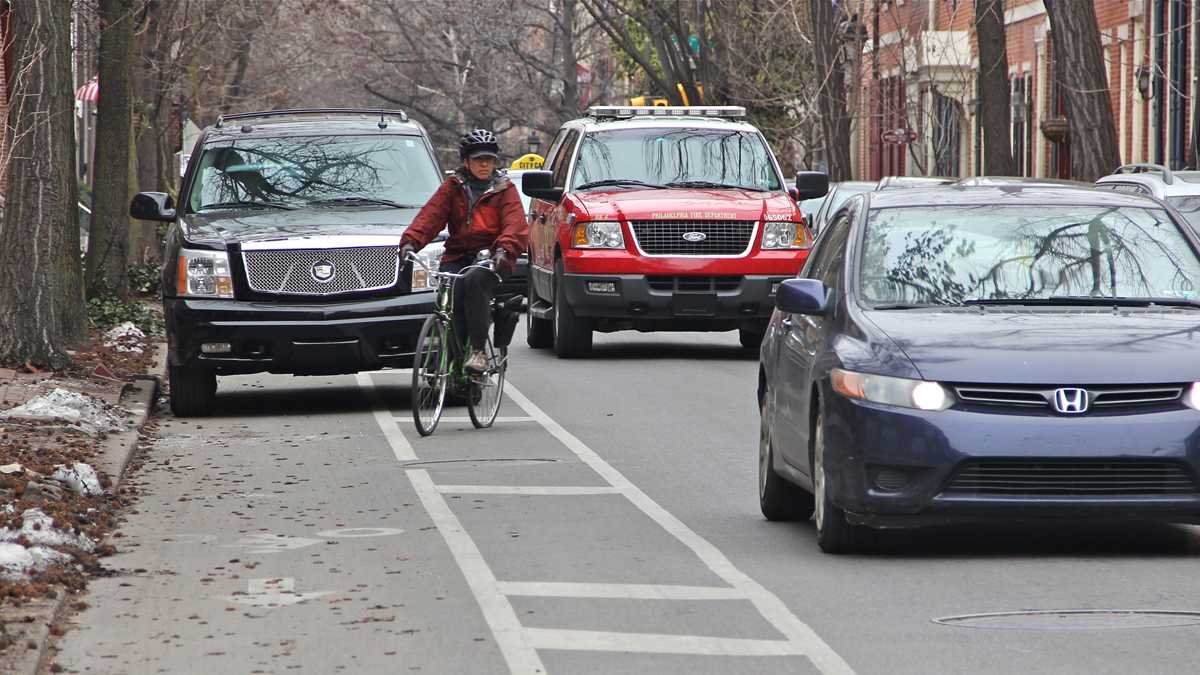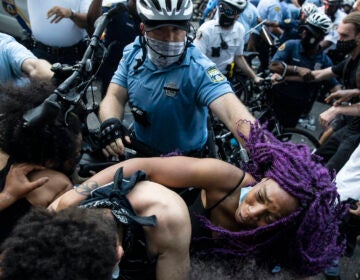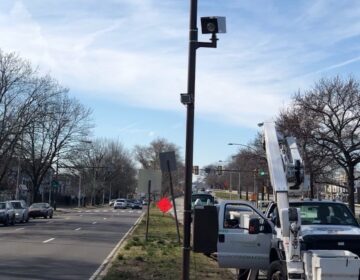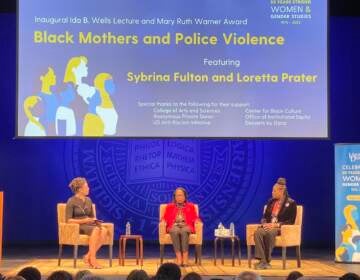Philly police no longer welcome in Vision Zero as bicyclists reckon with racism
The Bicycle Coalition will no “longer advocate for armed police enforcement” of safer streets rules. Philly officials say city policy could shift as well.

(Emma Lee/WHYY)
Advocates who first called for Philly to implement a Vision Zero plan –– a goal to reduce and ultimately eliminate bicyclist and pedestrian deaths –– say they’re dropping police enforcement of traffic violations from this strategy.
The Bicycle Coalition of Greater Philadelphia announced, in a blog post, that the organization had decided it was no longer appropriate to advocate for the use of city police to enforce safer streets.
“Armed, police-centered enforcement has no place in traffic safety policy, and will not lead to safer, healthier neighborhoods,” spokesperson Randy LoBasso wrote. “We will no longer advocate for armed police enforcement as part of Philadelphia’s Vision Zero policy. We will actively advocate against it.”
When ‘enforcement is not safe for people of color’
First popularized in Sweden and gradually embraced by policymakers around the globe, Vision Zero policies aim for street engineering improvements friendly to people traveling on bikes and foot, and greater emphasis on traffic safety enforcement. Mayor Jim Kenney embraced the platform on the campaign trail in 2015 and, following his election, signed an executive order creating the Office of Complete Streets to formally advocate for a localized action plan.
LoBasso said the Vision Zero coalition informed the city’s Office of Transportation, Infrastructure, and Sustainability, which oversees Complete Streets, of the policy shift.
Kelly Cofrancisco, an OTIS spokesperson, said city officials have not yet made a decision to abandon the police enforcement provision, but that the office had already emphasized the use of speed cameras and other automated tools over police stops.
“We’re considering it. We have a new plan coming out in the fall and it’s definitely time to reconsider some of the recommendations,” she said. “OTIS has always been in favor of automated enforcement because it removes that police interaction.”
While the Philadelphia Police Department asserted that it issued upwards of 100,000 traffic tickets to motorists in 2018, LoBasso said that, in practice, the Philadelphia Police Department had never officially taken up traffic enforcement as a major priority. He said the recent policy change was more about reconciling urbanist priorities and critiques of racial disparities in law enforcement, noting that Black people make up 68% of all police stops in Philadelphia but just 43% of the city’s population.
LoBasso cited the influence of Tamika Butler, a prominent urban planner, member of the California Transportation Commission and the former director of Los Angeles Bicycle Coalition.
“Too often, advocates for Vision Zero stay focused on enforcement for safety and fail to acknowledge that enforcement is not safe for people of color; in fact, it too often results in death,” Butler wrote in a 2018 Medium post, ‘Can Vision Zero work in a Racist Society.’
Philly among cities grappling with racism within urbanist policies
Butler and other Black and Latinx planners have long drawn attention to anti-Black racism within urbanist practices — a call that is finally getting results as Vision Zero groups around the globe change policies.
This is so imp & long overdue…hey advocates of color, esp black flx….remember how we were told what bad advocates we were for asking for this? Love to see this change. Want to thank all of you for knowing it was the right thing to do and pushing for it before it was popular. https://t.co/6AL1xjiE1x
— Tamika Butler (@TamikaButler) June 9, 2020
LoBasso, in his blog post, acknowledged the work that planners and transportation advocates still must do to reverse entrenched patterns and racist policies in Philadelphia.
“Our role in making streets safer cannot amount to making them unsafe for Black, Brown, Immigrant and Indigenous communities,” he said. “Policing and planning has historically been racist and confronting those bad policies requires rethinking how we work toward zero traffic deaths.”
The Coalition indicated that it would continue to work with the PPD’s Accident Investigation Division, which provides crash data that in turn informs street design improvements and strategy.
Center City resident Peyton Hinson works in tourism and began following trends in local urbanism because bicycle and pedestrian improvements can become big draws for visitors. When she read the Coalition’s statement, she was shocked to learn that Vision Zero had relied on ramped up police enforcement.
“If we need tickets, we have drones. If there’s an accident, we have medics. I don’t feel like we need police for the majority of our lives,” Hinson said. “I support defunding the police, I don’t think there’s a need for all that.
Policing should absolutely be removed. It’s unnecessary & perpetuates systemic racism. That last E should be ‘Engagement’ & particularly for BCGP, engaging w communities across Philly w first focus being underserved communities.
— Peyton (@greenbling333) June 11, 2020
She said there were other, less invasive means of improving traffic safely –– namely, pedestrianizing more of Philadelphia’s streets, particularly in the city’s crowded downtown.
“That’s a fantastic alternative,” she said. “And you don’t need more policing. You just need money…and the will to do it.”

Subscribe to PlanPhilly
WHYY is your source for fact-based, in-depth journalism and information. As a nonprofit organization, we rely on financial support from readers like you. Please give today.








